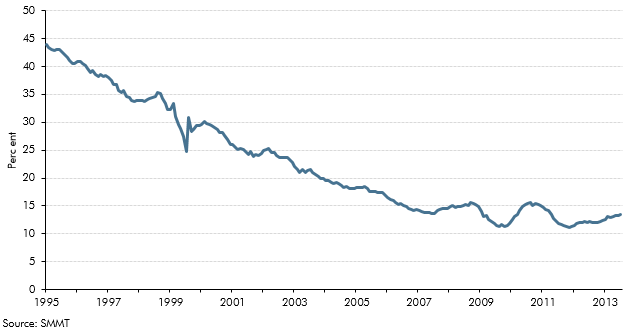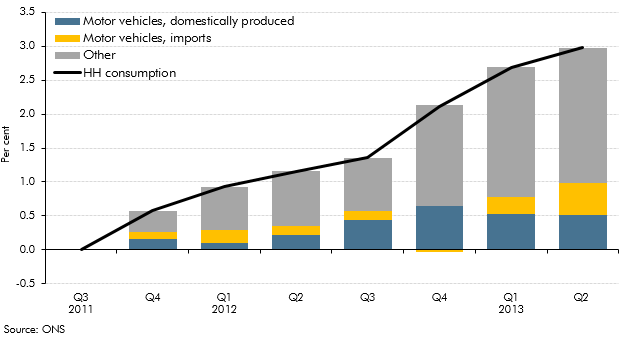Spending on cars in the UK has grown strongly, accounting for nearly a third of household consumption growth since the third quarter of 2011. This growth was facilitated by car finance, which contributed to strong growth in unsecured credit. This box showed trends in domestic share of car production and contribution of domestic and imported cars to household consumption growth over time. Together, they showed that while domestic car consumption was a good indicator of consumer confidence, and car trade in isolation helped reduce the UK's trade deficit, the overall effect on the economy was less positive.
This box is based on SMMT car production and ONS consumption data from June 2013 and November 2013 respectively.
In volume terms, spending on cars in the UK has grown strongly, accounting for nearly a third of household consumption growth since the third quarter of 2011. Facilitating this spending, car finance has been the main reason for the strong recent growth in unsecured credit.
Demand for durable goods, such as cars, is highly sensitive to consumer confidence and access to credit, both of which fell sharply in 2008 as the financial crisis deepened. The introduction of the car scrappage scheme in April 2009 gave a temporary boost to demand that ended in 2010.a The current recovery began in mid-2011, and has continued, with new car registrations rising more than 10 per cent a year.
But UK car consumption is highly import intensive. Chart C shows that the share of new car registrations met by domestic production has fallen from 45 per cent two decades ago to just 14 per cent now. This limits the benefit to GDP growth of stronger car consumption. Indeed, Chart D shows that more than half the contribution to household consumption growth from car consumption was accounted for by imports.
But the UK also produces cars for export and overseas demand has also been strong. While overall net trade has made a very modest contribution to GDP in recent years, the UK car-trade balance has moved from a 0.5 per cent of GDP deficit in 2007 to a small surplus in the first three quarters of 2013, helped by the strength of non-EU exports (particularly to China).b But again the impact on GDP is limited, as domestic car production uses nearly three times more imports for every pound of output than the economy as a whole.c So while domestic car consumption is a good indicator of consumer confidence, and car trade in isolation has helped reduce the UK’s trade deficit, the overall effect on the economy has been less positive.
Chart C: Domestic share of car production

Chart D: Consumption growth

